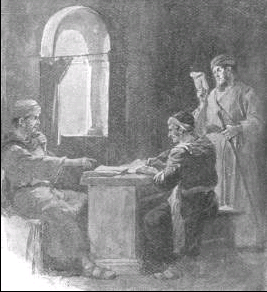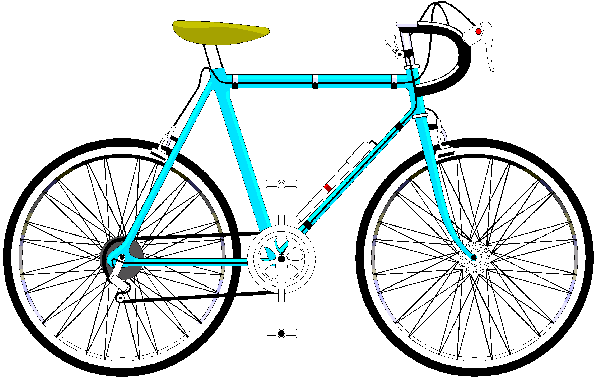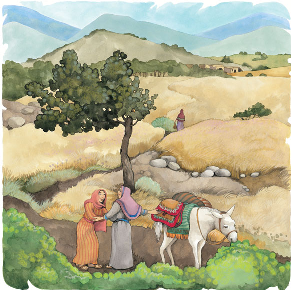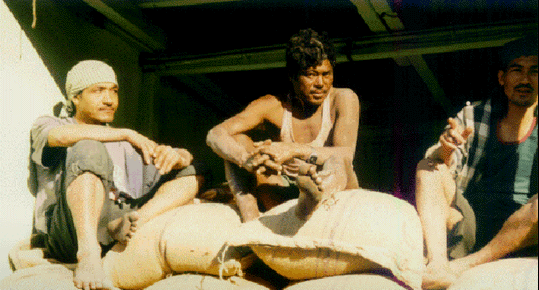
Pastor’s Storybook III–13

Caregiver and his wife Carmen come to Learner’s house to tell him, “Families are moving in from other parts of the country. Many live in rustic huts, not far, down the river. We should help them.”
“Let us go see them.” Learner replies.
They are looking at the pitiful huts that the people live in when they hear a bell tinkling. Mr. Foolish is pushing his cart rapidly toward them. He says, out of breath, “The police are soon going to drive these people away! They are on public property.”
Caregiver exclaims, “What a shame! I will plead with the authorities for them.”
“No!”
Mr. Foolish disagrees, “Let these people leave! They take jobs
away from workers who have always lived here. They have strange
customs. They dress differently. You will cause trouble with the
authorities again if you defend them. They are not your problem. If
you want to help poor people, you can help me. I need a bicycle. Then
I will be able to get around and invite more people to our church!”

Carmen groans.
 “Here,
look, Learner.” Mr. Foolish holds up a small bottle of white
powder. “Buy this elephant extract. Swallow a pinch a day and
you will grow larger.”
“Here,
look, Learner.” Mr. Foolish holds up a small bottle of white
powder. “Buy this elephant extract. Swallow a pinch a day and
you will grow larger.”
Caregiver
says, “My uncle tried it and said that it did not even make his
nose grow! Learner, we must help these who are desperately poor. I
read in the Bible how God tells us to help those in need. It does no
good just to hand them money. We must help them in other ways.”
He Tells the story of Dorcas.
Find in Acts 9:36-43:
What did the people say about Dorcas?
Whom did Dorcas help?
With
what attitude did Dorcas and Peter serve others?
Caregiver explains to Learner and Mr. Foolish as they stand looking at the poor huts of the newly arrived families, “Dorcas helped the poor and the widows who had no one else to help them. Both she and Peter served others with humility. When Peter arrived, he sent everyone from the room, knelt, and prayed. God raised Dorcas from the dead.”
Carmen adds, “We have an opportunity here to do much good for the Lord Jesus Christ. He commands us to give and to care for the needy.”
“Yes!” Learner replies. “He tells us in Matthew 25:31-46 that what we do for these poor families in love, we do for Him. God promises rewards in heaven for those who help the needy out of love for Jesus. 1 John 3:17 says that if we neglect them, we do not have the love of God in our hearts. Our love shows that we are children of God.”
Learner continues, “God gives us opportunities to give to others and serve them. We should give generously of our money, our time and abilities. Sometimes we overlook opportunities to give to God. We spend our money foolishly. We waste our time on foolish conversations, arguments, worry or worthless activities. These things are robbers. They steal our time and money. We must plan how to use our time, our spiritual gifts and our money for God. We must give with prayer and faith so that we can fulfill our plans.”
“Correct!” Learner affirms. “We must not be like the foolish builder in Luke 14:28-30. He could not finish his building because he failed to plan first.”
“These poor newcomers need our help.” Caregiver says, “The Bible reveals how God blessed those who aided people escaping from war, famine or oppression. Let us plan now to help these needy people. One example is the story of Ruth the Faithful Young Widow.”
Find in the book of Ruth:
In chapter 1, how did Ruth show courage and faith in God?
In chapter 2, how did Boaz show kindness to a foreign widow?
In chapter 3, how did the two widows take initiative in resolving their problem?
In chapter 4, how did Boaz risk his own estate to help someone else?
In
chapter 4, what good things did God cause to happen to Ruth as a result
of Boaz' kindness?
Carmen exclaims, “I see! The book of Ruth teaches both the needy and the rich how to act. Ruth had no income and no one to defend her against oppression. She was very poor. Nevertheless, she stayed faithful to God and to her mother-in-law. She was not lazy. She worked hard to gather grain in the fields of Boaz. She
was brave. She followed Naomi’s counsel and took the initiative to ask Boaz to defend her rights as an Israelite widow.”

Learner adds, “Boaz, on the other hand, was wealthy. He could have ignored Ruth. Instead, he was kind to her. He let her gather grain freely and kept his workers from harming her. He fulfilled his duty as a kinsman-redeemer even for a poor, foreign widow. At risk to his own property, Boaz took Ruth as his wife. God blessed this kindness. David and Jesus were descendents of Ruth and Boaz. The story of Ruth is an illustration of how Jesus redeemed all believers to be His bride. He is our Redeemer. He saves us in our need. Whenever we defend those in need, as Boaz defended Ruth and Naomi, we imitate Christ.”
Two Main Jobs for the Congregation
Learner continues, “I have read how Christ's people change the world. It has two main tasks. They are like the two legs that carry us. One job is to make disciples of Jesus Christ. The other is to serve people in love. All the horrible things in our world, like
poverty, suffering and war, came because of sin. They continue because sin rules our lives. When we repent and come to God, He breaks the hold of sin and begins to heal us of sin’s effects.”
They watch two men fight. One accuses the other, “You stole my beer!”
“We also have to tell these needy people about Jesus,” Carmen reasons.
“We will do both,” Learner says, “We shall work together as a church body. Jesus will break the hold of violence, poverty and corruption. When people turn to God, they give Him everything: their time, their jobs, and their families. We no longer live for ourselves. We stop stealing from each other and hurting each other. We begin to serve each other in love. If we are poor, we remain faithful and work hard like Ruth. Those who are wealthy or powerful must not serve themselves. Like Boaz, they must serve others, so that everyone will be treated fairly and live in peace. Let us talk with those men before they kill each other and find how we can help them to solve their real problems.”

Mr. Foolish says, “I refuse to go near them. They have diseases.” He pushes his cart back up the street, ringing the bell.
The next day Learner and Caregiver meet with the other elders and plan to help the new families. They pray for God’s help and for the needy people. They visit them several times to find out what they need most. They work together with them to build a well because the river water contains amoebas. Helper arranges for employment for some of the men and schooling for their children. Carmen understands their dialect, which is somewhat different, and teaches the women to speak the local dialect. She translates for them when they talk to doctors or government officials.
The new families respond in gratitude. They embrace the good news about Jesus. Helper and Caregiver start a congregation and train several of the men as leaders. Helper helps them write songs about their faith and to sing in their own unique music style. In a few months more come to Christ than in all the other congregations.
Use the stories in this section to help your people serve the needy in the name of Jesus.
Help those with the spiritual gift of compassion to organize ministries to help the people that no one else wants to help in your community. These might include immigrants, refugees, widows, orphans, alcoholics or drug addicts, those in jail and people in great economic stress.
Find ways to help those in need take the initiative to resolve their problems.
Work for justice for mistreated people, even at risk to you.
Let only honest people be responsible for the offerings of the congregation and help them keep good accounting records.
Instruct the treasurer never to loan money or give it to anyone without the elders’ approval.